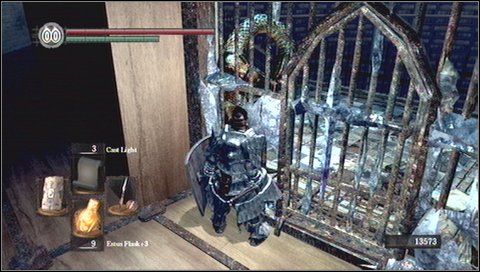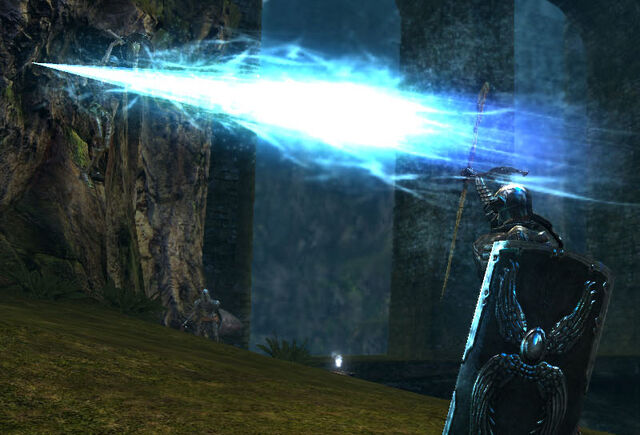This is where Dark Souls presents a very elegant solution to the 5 minute work day while still preserving the feel of Vancian magic. Spells are attuned to slots, some spells are quite powerful and require 2 slots which is consistent with the description set by Mazirian and Turjan. The number of slots you can hold is dictated by your attunement stat, a stat that exists purely for more slots and thus more chances to cast spells, it is a replacement for MP that its predecessor and a number of other games have used. It should be noted that attunement slots can be used for any combination of sorceries (arcane), miracles (divine), or pyromancy (once more fire is given its own special place in the game).
Now then, each spell requires you to find and/or purchasea scroll and each scroll can be attuned to a specific slot. Each spell also has a limited number of casts, although if you are fortunate enough to find another merchant selling that particular spell you may allocate it to two slots thus doubling the number of casts. Your spell casts are refreshed whenever you visit a bonfire, but as I mentioned in Recovery and Exploration visiting a bonfire resets your resources but also the resources of the world; quite like how your typical dungeon tends to restock after a given number of time. As a spell increases in strength its number of uses diminishes, so its not always in your best interests to slot in doomsday spells unless you have someone particular in mind to alpha strike. Let's take a look at an example, the typical progression for your average sorcery using the all around useful Soul Arrow. The initial spell has 30 casts, Greater souls arrow grants only 20 casts, Soul Spear the faster and immensely stronger version has but 4 casts. The more powerful the spell the less often you can wield it creating an excellent sense of resource management where you must decide if each and every foe is worthy of using your almighty but limited spellcast. The exception to this is for Crystal spells, gained from the crystal dragon Seath who created through aeon's of dark research. They are flat out improvements over regular spells, from a design perspective this might seem obviously unbalanced but the spells exist as a reward. You purchase them, at a hefty cost which slows down your level progression but they are a reward for your hard work gained only from one of the most dangerous and often frustrating of dungeons. Acquiring the crystal spells is an accomplishment that separates the average caster from one who has braved and escaped the deadly Dukes Archives.
 |
| Bless your heart lazy snakeman jailer |
So we have spell slots, scrolls that are either hard to find or cost an extreme expense of resources, sounds pretty Vancian so far. The main dividing line is that spells are not organized by level and they are not necessarily fire and forget (but are certainly not unlimited either as I've mentioned above). To address the first point, the Souls games are designed in mind that you may complete the game regardless of how you build your character with regards to stats, this isn't that different from OD&D and its absolute lack of modifiers. But in Dark Souls you can complete the game at level 1, it is certainly not easily but it entirely possible. As such you can frivolously waste your points to try out different things and different stats, or in my case to intentionally make the game harder for yourself (min-maxing can make the game particularly easy). To go along with this paradigm spells are not restricted by level but they are however, restricted by one's stats and the most powerful spells will require some degree of leveling before you can quite understand their arcane mysteries. Fair enough, even Cugel was not Clever enough to fully wrap his head around the arcane trickery he devised on the oft accursed Iucounu. On the other hand, Pyromancy has no requirement and is usable by anyone provided they have access to a teacher and a flame. This fits in very well with the game's mythology where Fire is symbolic as a great equalizer and is responsible for the freedom of mortals in the current age.
In either event an extremely expensive spell with the games economy ensures you won't be able to purchase it until after you've progressed to higher earning areas. They can be found as cast off items on precarious ledges or guarded by deadly guardians. This means you must be strong enough to enter that area and have enough cunning to exit it. Vendors also have to be rescued before you can even purchase anything more than the most basic of spells (or any at all for that matter). While level restrictions are not hard coded into the game you can see how it requires a time investment to reach these areas to rescue these items and vendors as well as a bit of skill or power (level) to actually enter these areas. The truly cunning can make it all the way there with none of these, but as we often champion the notion, OD&D is about player ingenuity not necessarily their gear or the strength of their numbers. As such I find this to be a very encompassing alternative to some of the weaknesses of the traditional Vancian system.
Continue on to the final part of the series here.



No comments:
Post a Comment